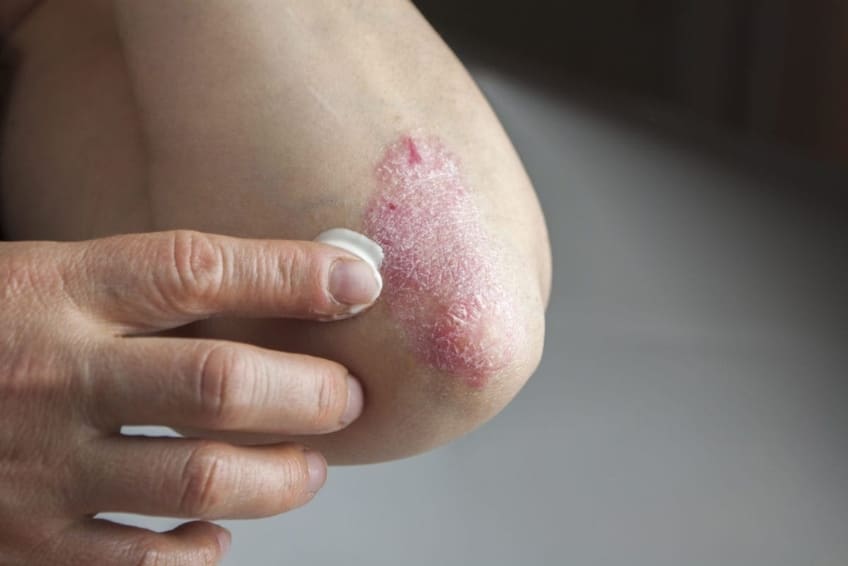
What is psoriasis?
Psoriasis is a common chronic skin condition. There are several types of psoriasis. The main type is plaque psoriasis. It occurs when skin cell overgrowth forms a type of rash on your skin. The rash often is raised with red marks and flaky white patches that look like scales.
Symptoms
The symptoms of psoriasis may include:
- Red or pink raised patches of rough, scaly skin
- Dry or flaky skin that may crack and bleed
- Skin that burns or stings
- Skin that is itchy or sore
- Thick, bumpy fingernails
- Pus-filled blisters on the red patches of skin (in more severe cases)
Symptoms can occur anywhere on your body. Common places are your knees, elbows, and scalp.
Causes
Psoriasis starts with the immune system. Your immune system protects your body against infection and disease. When you have psoriasis, your T cells (a kind of white blood cells) wrongly attack your skin cells. This causes your skin cells to rapidly produce and swell.
Most people who get psoriasis are between the ages of 15 and 35. Psoriasis can be genetic, and it is not contagious. You cannot get it from another person or give it to someone else by touching them. You also cannot spread it to other parts of your body.
Diagnosis
It may be hard to diagnose psoriasis. This is because it looks like other skin problems, such as eczema. Talk to your doctor if you think you have psoriasis. The doctor will do a physical exam and review your symptoms. They may take a biopsy of skin and look at it in the lab to help with your diagnosis. They may refer you to a dermatologist (skin doctor).
There are different degrees of psoriasis:
- Mild: symptoms cover less than 3% of your body.
- Moderate: symptoms cover 3% to 10% of your body.
- Severe: symptoms cover more than 10% of your body.
Can psoriasis be prevented or avoided?
You cannot avoid psoriasis, but you can help control it. People who have this condition may experience periods of time without any symptoms. Other times, psoriasis can flare up or get worse. Avoid factors that can cause flareups, including:
- Stress
- Dry skin
- Skin irritations
- Cold weather
- Smoking
- Infections (such as strep throat or the common cold)
- Diseases that weaken the immune system
- Certain medicines (such as beta-blockers for high blood pressure)
Treatment
There are several treatments for psoriasis. Your doctor will help you decide which one is best for you. Try an over-the-counter product first to moisturize your skin. Body lotion and moisturizing creams can help keep your skin from getting too dry and cracking. It can remove some of the scales or rough patches. Bathing in Epsom salts, Dead Sea salts, bath oil, or oatmeal can relieve symptoms as well. It can help reduce redness and itching and remove scales.
If over-the-counter solutions don’t work, your doctor can prescribe topical medicines. These include prescription creams, ointments, lotions, and gels. You apply these to your affected areas. Cover the treated patches with plastic wrap to help the medicine stay on your skin. You can use special shampoos for psoriasis on the scalp.
Your doctor may prescribe medicine in pill or injection form. This is more common in severe cases or when the condition is widespread. Some of these medicines can cause side effects. Often, you take these for a short period of time, like when symptoms flare.
Sunlight can help psoriasis but be careful not to stay in the sun too long. A sunburn can make your condition worse. Talk to your doctor about how to safely use sunlight exposure as a form of treatment. Light therapy can be another option if symptoms are confined to certain areas of your body. With this treatment, the affected skin is exposed to controlled forms of artificial sunlight. Your doctor may also have you take Psoralen, which makes your skin more receptive to light. This is known as PUVA treatment.
Living with psoriasis
There is no cure for psoriasis. The goal of treatment is to relieve symptoms and reduce flares. People who have psoriasis may develop psoriatic arthritis. This affects your joints and causes swelling, stiffness, and pain. Psoriasis can be linked to other health conditions. Examples include diabetes and heart disease.
Questions to ask your doctor
- How long does treatment last?
- Will I have to be on medicine for the rest of my life?
- Should I make any changes to my skin care routine?
- Are there any skin products or foods that I should avoid?
- If symptoms get worse, when should I call the doctor?
- If I have psoriasis, will my children get it?
- Is there a support group that you recommend?
Resources
![]()
Copyright © American Academy of Family Physicians
This information provides a general overview and may not apply to everyone. Talk to your family doctor to find out if this information applies to you and to get more information on this subject.









